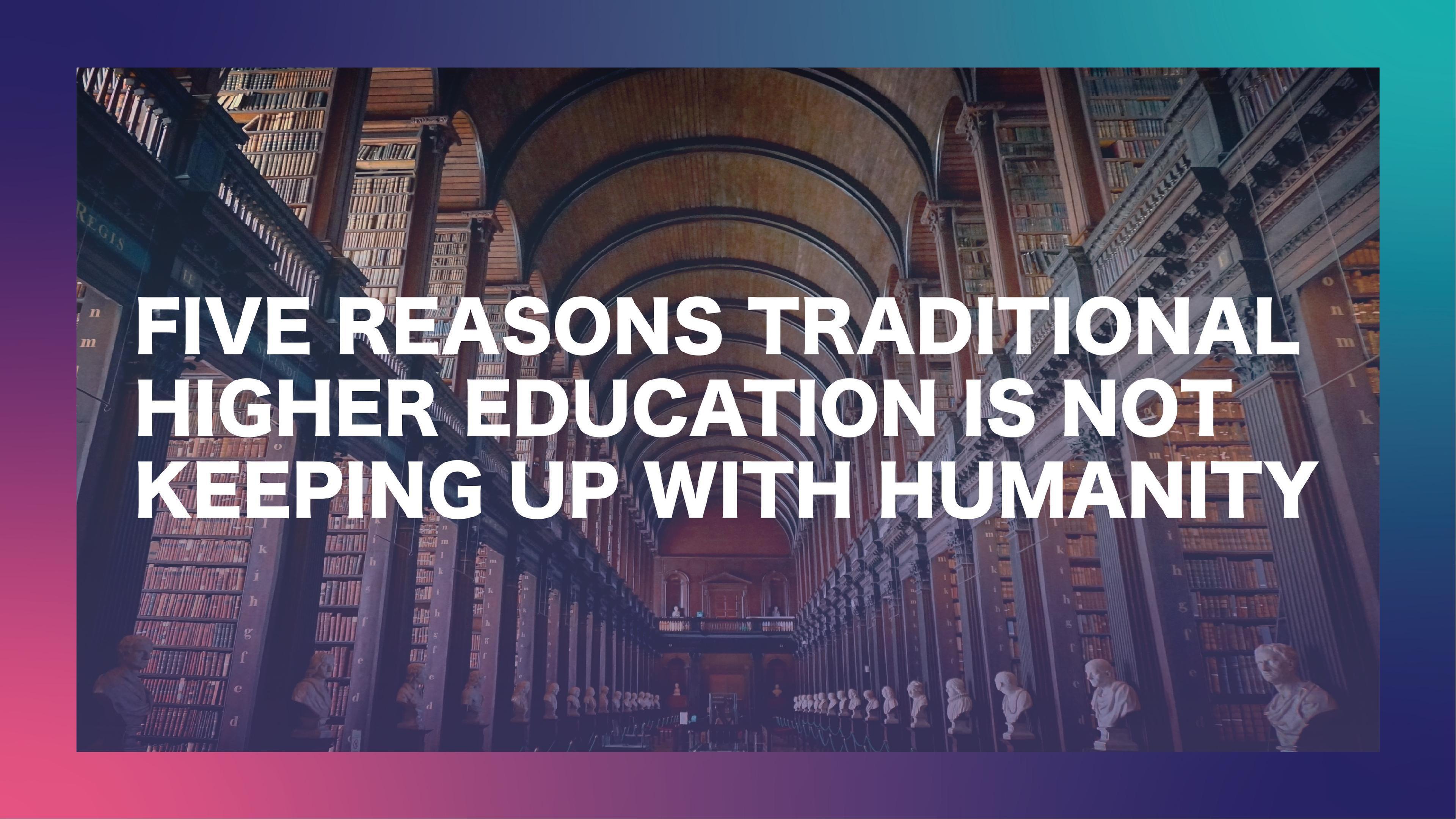Five Reasons Traditional Education Is Not Keeping Up With Humanity
Fast-paced growth in innovation, communication and technology is forcing a quiet revolution in education, leaving many traditional universities struggling to keep up.


Writer at Harbour.Space University
Fast-paced growth in innovation, communication and technology is forcing a quiet revolution in education, leaving many traditional universities struggling to keep up.
Humanity is moving forward. Are all universities doing the same? Debatable.
Here are five reasons why traditional universities are not keeping up with humanity's evolution:
1) the Half-Life of Knowledge
The half-life of knowledge is the amount of time it takes for half of the knowledge on a subject to become outdated or obsolete. At the rate with which humanity is discovering and implementing knowledge in tech-related fields, where processor speeds double every two years and global trends spread like wildfire, it’s no surprise that the half life of IT knowledge does not exceed 24 months.
This presents a genuine concern for traditional universities - it means that, in order to stay relevant, they are required to refine their faculty, subjects, and teaching methodologies at least once every two years. Traditional universities cannot keep up with this exponentially increasing rhythm - with all the bureaucracy and regulatory hoops they’re required to jump through, modifying the curriculum of one of their programs still takes approximately four years.
2) Knowledge Economy Vs. Innovation Economy
Education’s purpose has been shifting to accommodate the needs of the industry ever since the Industrial Revolution, where it went from a luxury to a societal requirement. We used to value acquiring knowledge back when there was no computer or Google to put it at our fingertips. However, in the era of the Innovation Economy, where knowledge is easy to acquire, simply memorizing information just doesn’t make sense anymore; what one does with that knowledge -- innovation, market disruption, industry revolution -- is key.
Consequently, as long as academic models are still examining students for retention of outdated knowledge through standardized tests, they are not preparing students to disrupt the markets of the future.
3) the Rise of Artificial Intelligence
The imminent rise of AI means that universities should incorporate technology in everything from course content to teaching methodology. In the long run, universities who prepare students for the age of AI will produce graduates who will know exactly what kind of world they’re here to impact, and who will also have the skills and vision to do so. Contrastingly, universities that do not implement AI in the curriculum or technology in the classroom and that discourage or even prohibit students from doing so are not preparing them for the workforce of tomorrow. They are diminishing these students’ growth, limiting their potential, and excluding them from an inevitable future. Aren’t schools supposed to do the opposite?
4) Technical Skills Have Become Replaceable
A 2018 report from the World Economic Forum found that 1 million current jobs will vanish by 2026. Some industries, such as Production and Administrative tasks, will experience such major waves of job disruption that up to 80% of jobs in these sectors will be lost or changed. This fast changing industry has massive implications for traditional universities.
This means that technical knowledge they teach in these fields will be at risk of becoming obsolete, and will need constant evaluating and updating, which is a problem in itself for them (see: Half-Life of Knowledge). With so many positions that will be automated by technology, universities should be very conscious of complementing traditional skills with character traits that cannot be replaced or automated, such as adaptability, resourcefulness, creativity, leadership, critical thought, and autonomous learning, all of which are crucial for the workforce but not fundamental learning objectives in traditional education. This shift of focus from hard to soft skills will produce graduates who are equipped with the qualities to successfully adapt to, navigate through, and excel within any challenging workplace environment, regardless of what it looks like.
5) Decentralized Education Has Become More Than an Appealing Alternative
Traditional universities have to consider one final fact - decentralized, alternative education is becoming more accessible, effective, and recognized. The internet has created a web of knowledge that has become a fundamental, if not the primary, resource for knowledge acquisition. E-learning has all of the characteristics that traditional universities lack: its curriculum is dynamic and easily updated for the shifting needs of the industry, it is accessible from most places in the world, it provides a more personalized learning experience, and, compared to traditional universities, it is far more inclusive in terms of bureaucracy and pricing. What’s more, this new age of education has seen the rise of progressive universities with alternative models of learning based on the real needs of the industry, whose vision of and methodology for producing industry-ready graduates is far more appealing and effective than that of traditional academic centers.
In short, humanity is ready to take learning to another level - so if you’re listening, traditional universities, the message is simple: step up your game or get left behind.
What is your take on traditional education? Any ideas for how to improve the educational system today?
Shoot us an email at hello@harbour.space and let us know what you think!
Thanks for reading
If you’re interested in further growth, take a look at our website to learn what your future could look like at Harbour.Space. Lastly, get in touch with us at hello@harbour.space to let us know your thoughts!
